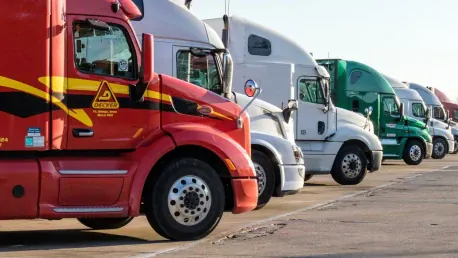The rapid evolution of the e-commerce sector, marked by consumer demands for quick and reliable deliveries, has exerted significant pressure on retailers to enhance their logistics and supply chain operations. Faced with these challenges, many retailers are increasingly turning to fleet management systems as a strategic solution to streamline their vehicle fleets’ operations. By leveraging advanced technologies such as real-time tracking, route optimization, and vehicle maintenance scheduling, fleet management systems significantly contribute to minimizing delivery times, reducing fuel costs, and improving overall operational efficiency. The global commercial vehicle fleet management market for the retail industry, projected to surge from $3.49 billion in 2023 to $7.58 billion by 2032, underscores the growing reliance on these systems. The compelling rise of fleet management systems illustrates their integral role in not only meeting operational demands but also maintaining a competitive edge in a rapidly evolving market landscape.
Fleet management systems provide a suite of invaluable tools tailored to meet the complex demands of modern retail logistics. Real-time tracking allows retailers to monitor the precise location of vehicles within their fleet, thereby ensuring timely deliveries and enhancing customer satisfaction. Furthermore, fleet management solutions enable route optimization, which assists drivers in navigating the most efficient paths, avoiding traffic congestion, and adhering to tight delivery schedules. This level of operational efficiency translates into tangible benefits, such as significant reductions in fuel consumption and vehicle wear and tear. Consequently, retailers can achieve considerable cost savings and mitigate the environmental impact of their logistics operations. Given the intensification of consumer expectations regarding delivery times, the deployment of sophisticated fleet management technologies is becoming increasingly indispensable for retailers.
In addition to operational benefits, fleet management systems play a pivotal role in enhancing safety standards within retail logistics. These solutions offer critical insights into driver behavior and vehicle performance, enabling retailers to identify potential safety hazards and implement corrective measures proactively. For instance, monitoring driver behavior such as excessive speeding, harsh braking, and abrupt acceleration can help mitigate the risk of accidents and improve overall road safety. Similarly, regular vehicle maintenance scheduling ensures that the fleet remains in optimal working condition, reducing the likelihood of breakdowns and ensuring the reliability of delivery services. By prioritizing safety through these advanced technologies, retailers not only protect their assets but also foster a culture of accountability and responsibility among their workforce.
Key Market Players and Trends
The commercial vehicle fleet management market is marked by notable contributions from several key players who continue to advance the capabilities of fleet management solutions. Companies such as EROAD Inc., Geotab Inc., Linxup, Merchants Fleet, and ORBCOMM are at the forefront, providing innovative tools that enhance the operational efficiency and safety of retail fleets. These organizations offer a diverse array of solutions tailored to meet the needs of retailers, from scalable fleet management software to sophisticated telematics systems. Their ongoing commitment to research and development ensures that fleet management technologies remain at the cutting edge, capable of addressing emerging challenges within the retail logistics landscape.
In line with the growing market for electric vehicles (EVs), the commercial vehicle fleet management sector is also witnessing a significant shift towards EV-based fleet management solutions. With an increasing number of retailers adopting electric vehicles for their fleets, fleet management systems are evolving to incorporate features that support the unique requirements of EVs. These include battery monitoring, optimized charging schedules, and integration with renewable energy sources to reduce carbon footprints. The digital transformation within the automotive industry further fuels this trend, enabling seamless integration of fleet management technologies with electric vehicle infrastructure. As retailers embrace the sustainability movement, the development of solutions tailored to EV fleets is poised to become a critical driver of market growth.
Regional Market Dynamics and Regulatory Landscape
The e-commerce sector’s rapid evolution and consumer demand for quick, reliable deliveries have significantly pressured retailers to improve logistics and supply chain operations. To address these challenges, many retailers are increasingly adopting fleet management systems. These systems use advanced technologies like real-time tracking, route optimization, and vehicle maintenance scheduling to streamline operations. This approach not only minimizes delivery times and reduces fuel costs but also enhances overall operational efficiency. The global commercial vehicle fleet management market for the retail sector is expected to grow from $3.49 billion in 2023 to $7.58 billion by 2032, highlighting the growing reliance on these systems.
Fleet management systems offer tools to meet the complex demands of retail logistics. Real-time tracking ensures timely deliveries and customer satisfaction, while route optimization helps avoid traffic and stick to delivery schedules, reducing fuel consumption and vehicle wear. These systems also improve safety by monitoring driver behavior and scheduling regular vehicle maintenance. By prioritizing these technologies, retailers can save costs, reduce environmental impact, and maintain a competitive edge in the market.









